From Opal Lee to MLK, this Memphis author chronicles Black history for children
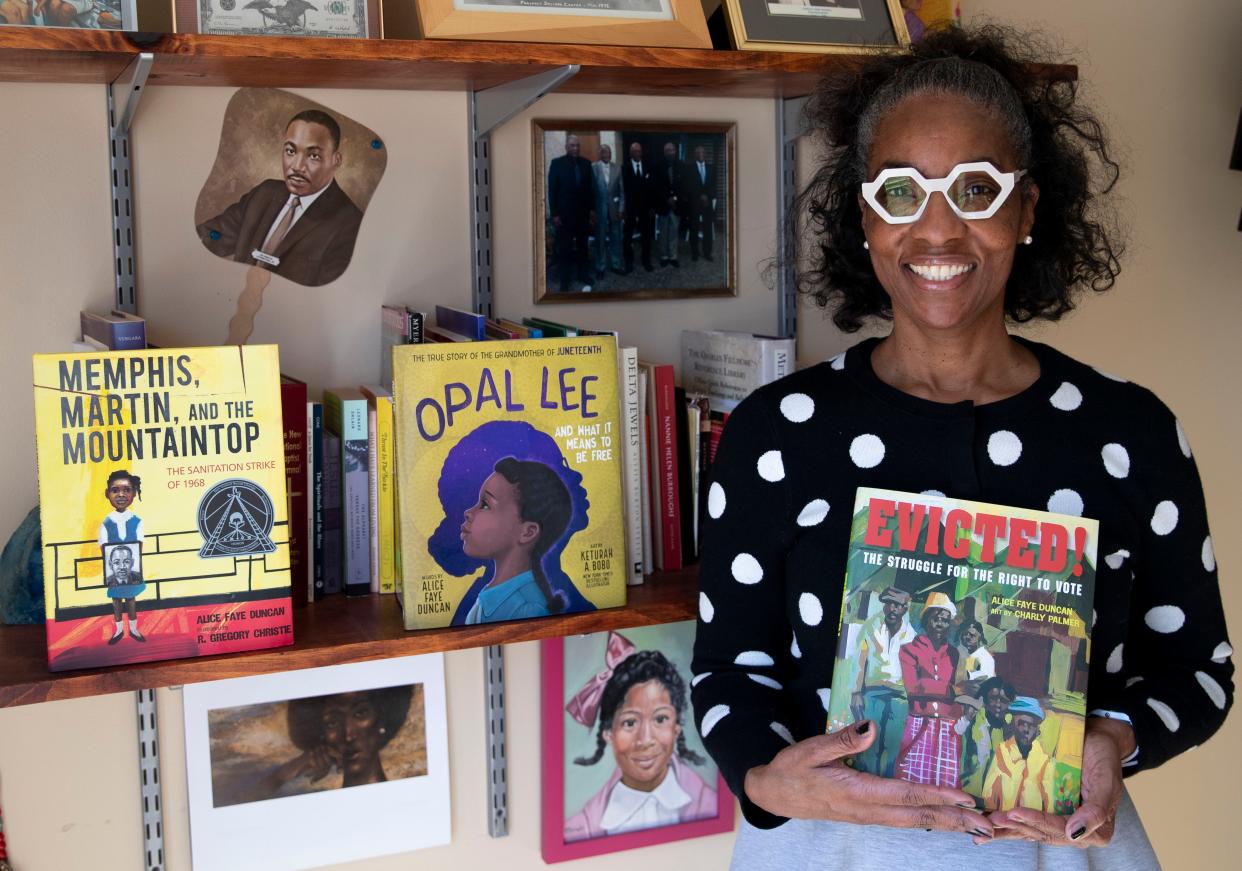
When news services reported earlier this month that 33 members of Congress had signed a letter nominating 95-year-old Texas schoolteacher and activist Opal Lee for the 2022 Nobel Peace Prize, a Memphis woman had special reason to celebrate.
"This is amazing to my soul," said Alice Faye Duncan. "Do you realize that my book is the first official biography that has been published about her life?"
Released in January, Duncan's "Opal Lee and What It Means To Be Free: The True Story of the Grandmother of Juneteenth" is a 32-page picture book that recounts the hard-fought end of slavery in the U.S. and Lee's struggle to have the effort recognized with a federal holiday.
According to a review in Booklist, the journal of the American Library Association, Duncan's tome — filled with colorful, painterly illustrations by Ohio artist Keturah A. Bobo — presents "a joyous account of Juneteenth’s meaning that doesn’t overlook the harsher aspects of history or the work that is yet to be done."
As Opal Lee says in the book: “Juneteenth is freedom rising. And freedom is for everyone."
"Opal Lee" is Duncan's 13th book for young readers since the career Memphis public schools teacher and librarian sold her book "Willie Jerome" — about a boy who fills his neighborhood with music from his be-bop trumpet — to the major publishing firm Macmillan close to 30 years ago.
Another book, "Miss Viola and Uncle Ed Lee," about a little boy who plays matchmaker, was purchased soon after.
"I thought, 'If I sold these books to major New York publishers, that means I have the gift, and I will not be working in schools for three decades,'" said Duncan, 54.
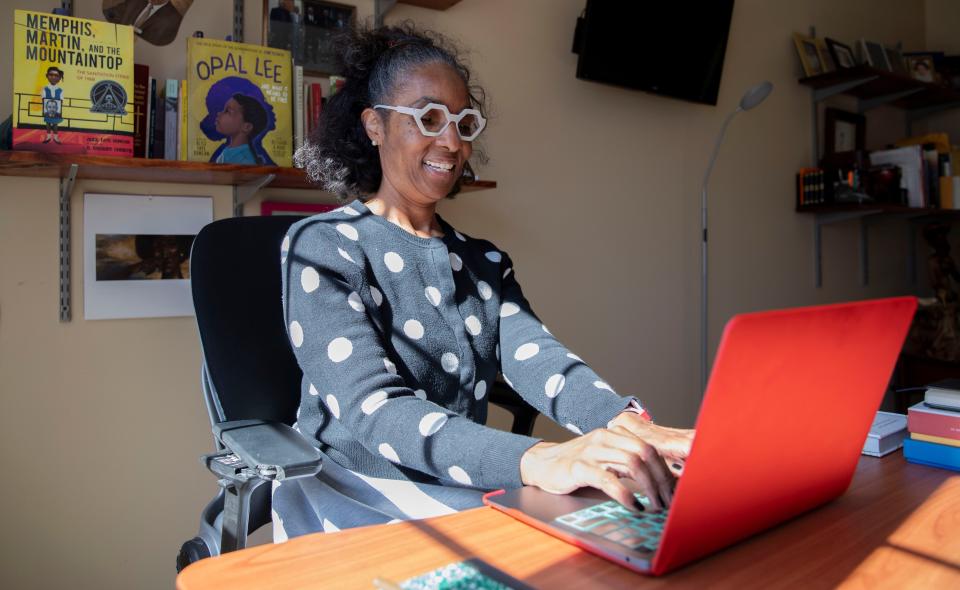
But she soon learned that making a living by writing children's books was not as easy as one, two, three, or even one fish, two fish, red fish, blue fish.
"At some point I resigned myself to the idea that I was going to spend my life working," she said. "But here is the beautiful thing about teaching school: You get off at 3 o'clock, and you have every weekend to yourself. This writing career has been three decades of rejection, sweetheart, but I'm writing creatively on every day the good Lord makes available to me."
BLACK HISTORY IN MEMPHIS: 5 landmarks you should know and the stories behind them
THE FOUR WAY: New mural honors the past and present of landmark Memphis restaurant
'The road to critical thinking is books'
After a fast start followed by a slow stretch, Duncan lately has found more acceptance than rejection. Published by Thomas Nelson, a subsidiary of HarperCollins, "Opal Lee" is only one of two picture books from Duncan that debuted in January. The other, with illustrations by Charly Palmer, is "Evicted! The Struggle for the Right to Vote," from Calkins Creek Books.
Built around the real-life stories of some of its participants, "Evicted!" revisits Fayette County, Tennessee, in the early 1960s, when Black sharecroppers launched a "Tent City" protest movement after being evicted by white landowners, who were punishing them for registering to vote.
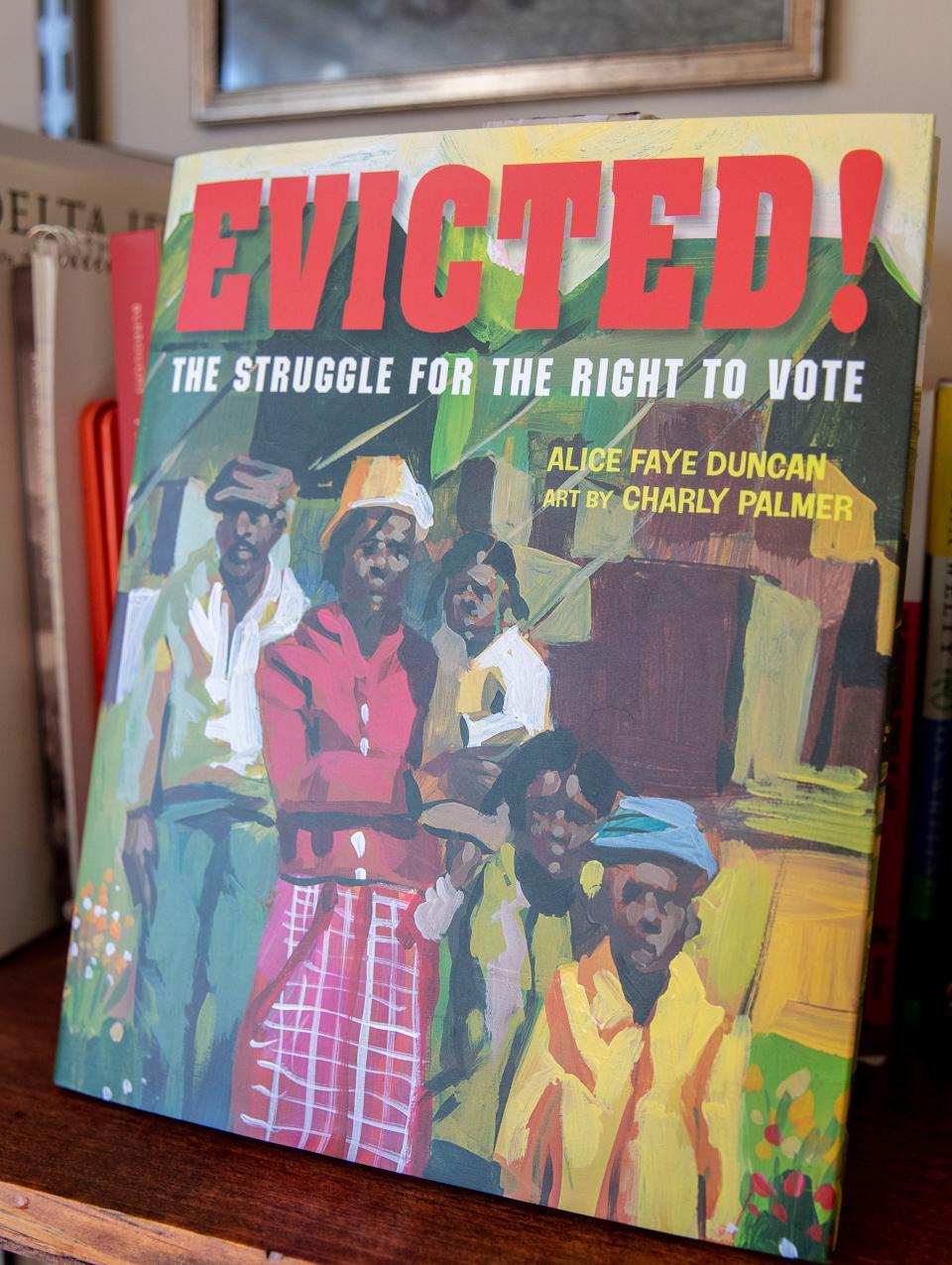
As her latest works demonstrate, Duncan's books spotlight African-American characters and are drawn from Black history or inspired by the traditions of Black family and community life.
"A Song for Gwendolyn Brooks" introduces young readers to the first Black poet to win the Pulitzer Prize. Told in dialect, "Honey Baby Sugar Child" expresses a mother's love for her child. "Memphis, Martin, and the Mountaintop: The Sanitation Strike of 1968" is self-explanatory. (Duncan's website, alicefayeduncan.com, includes downloadable lesson plans for most of her books.)
"Because I teach school, I know the curriculum, and I see the gaps in the curriculum," she said. "I'm talking to children and asking if they know why Dr. King came to Memphis, and year after year the only thing they knew was that he was killed on the balcony.
"I also see what children may need for affirmation and empathy."
Duncan feels such books are especially necessary in the context of recent controversies in Tennessee and other states regarding voting rights, books in school libraries and history lessons about racism in America. Duncan calls such efforts "anti-critical thinking."
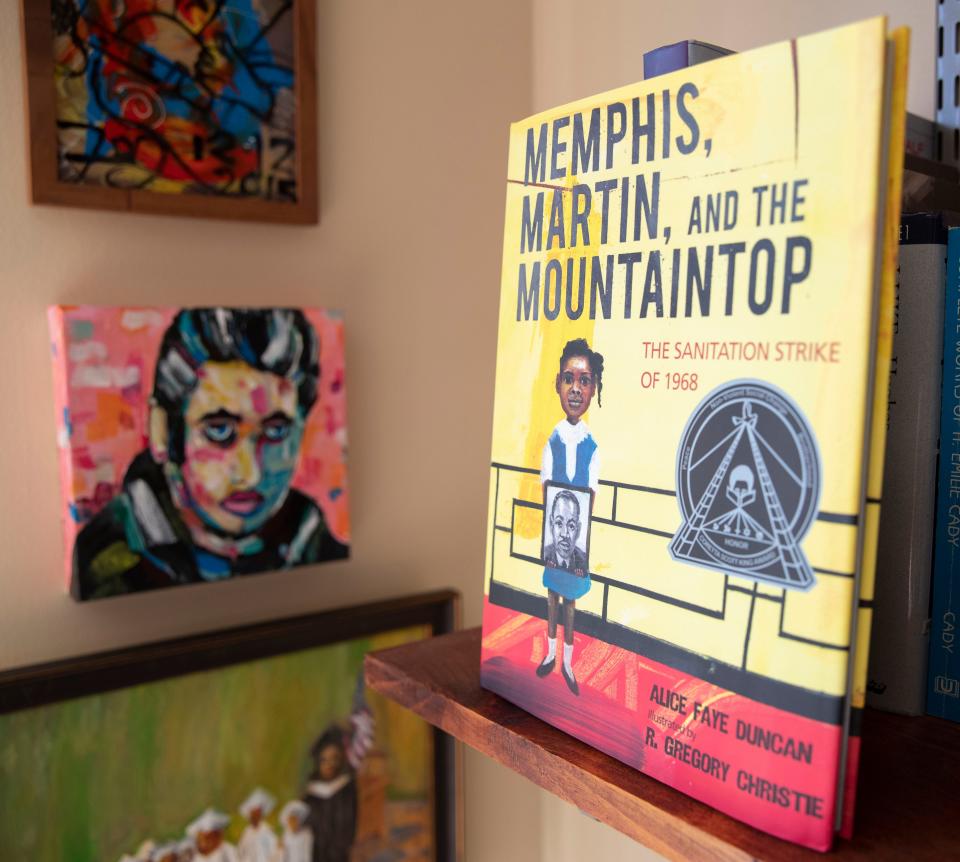
"Evicted!," for example is especially "timely" for young readers, she said. "Today, they are children, but tomorrow they are voters. Their voting rights are being assailed today."
“The road to critical thinking is books," Duncan said. "When you are banning books it means you are not in support of having an educated electorate.”
She said history is not always inspiring, and excluding its harsh lessons is an insult to the people from the past who want their life stories reported truthfully and honestly.
"Writers are always looking for stories," she said, "but also stories are always looking for writers. They're looking for a brain and body. The dead want to talk, they want a voice and a body to share their stories."
BLACK HISTORY MONTH IN MEMPHIS: Stax Museum looks to pass on record label's legacy with Black History Month programming
MEMPHIS NEWS: National Civil Rights Museum announces launch of Corporate Equity Center
Growing up in South Memphis
Duncan's interest in education is no surprise. Her mother, Earline Duncan, 85, was a city schools teacher (in fact, she was the first Black teacher at Snowden), while her father, the late Kenneth Duncan, was a Vietnam veteran and high school ROTC instructor. (Duncan's husband, businessman Michael Thompson, also comes from a family of educators.)
Meanwhile, Duncan's childhood Wellington Street neighborhood in South Memphis was populated with yet more principals and teachers — not to mention politicians and police officers, cab drivers and domestics.
"It was very eclectic," Duncan said. "It was sort of intergenerational. It was all Black, but you had all these disparate people from different professions living together. It was a vibrant neighborhood, a loving neighborhood, where neighbors were like kinfolk."
An only child, Duncan spent a lot of time reading. "When I was a child I would gravitate to the books on the shelf that were easier to read, and those were the poetry books. Gwendolyn Brooks. Langston Hughes. He was not using big words and the language was spare. I could read a Langston Hughes poem on my own, honey."
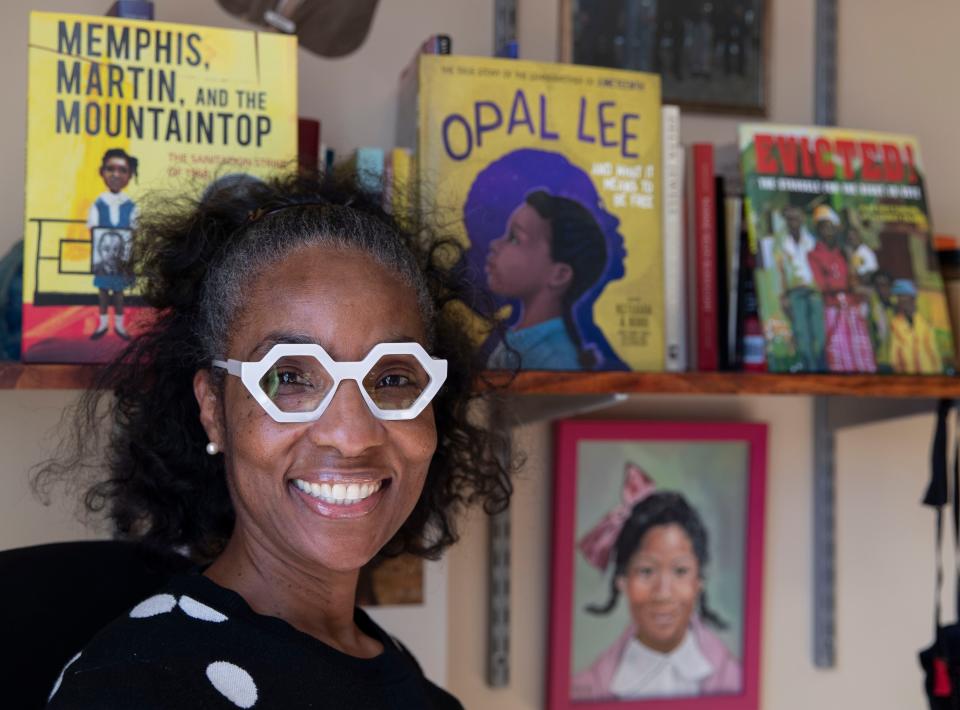
Duncan "fell in love with words" and determined to be a writer. She credits her instructors and professors at the University of Memphis with teaching her the craft and discipline necessary to corral her "all over the place" ideas into coherent narratives.
Eventually, she realized that picture books, with their colorful illustrations and relatively simple sentences, seemed an ideal way to combine her interest in poetic language and meaningful subject matter.
"Picture books are very close to long-form poems. The text is spare. There's lyricism, but they don't necessarily have to rhyme. They tap into emotion while also giving you information."
Duncan said she enjoys writing about "moments in history that talk about not only the triumphs but trials of Black people." She said she enjoys presenting these "challenging" stories in an entertaining format with appeal for young people.
"I have a gift, writing is it, writing for young learners. And I'm going to continue to use it as long as I have a life to do it."
This article originally appeared on Memphis Commercial Appeal: Alice Faye Duncan's books put spotlight on Black history for kids
